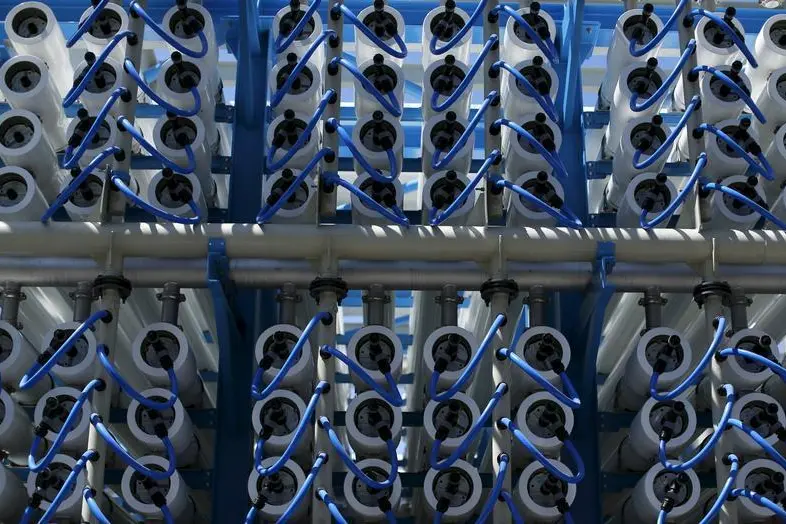PHOTO
In late June the Department of Energy (DoE) announced it had shortlisted 25 companies for a tender to develop, finance and operate a new Dh2bn ($544.6m) desalination facility at the Al Taweelah Power Complex, 45 km north of Abu Dhabi City.
Among the firms on the shortlist are Marubeni, Mitsubishi, Sumitomo and JGC of Japan; French firms Engie, Veolia and Suez; Saudi-based Acwa Power; Acciona Agua and Valoriza of Spain; and Malaysian water and power producer Malakoff.
The facility, which is expected to be the largest in the world when complete, will comprise two plants with a combined production capacity of 900,000 cu metres per day. Reverse osmosis (RO) will be employed to purify the seawater, rather than the distillation technique generally employed in the region.
Under the terms of the tender, winning bidders will own up to 40% of a special purpose vehicle formed for the project, with the remaining balance held either directly or indirectly by the DoE. The final decision is due to be revealed by the end of this year or early next, with construction scheduled to start in 2020, followed by production in 2022.
Abu Dhabi currently has 11 desalination plants. Four of these utilise RO, and with a combined output of 580,000 cu metres of water per day they represent 13% of the emirate’s desalinated water production. However, once the new plant comes on-stream, RO-processed water will represent 30% of total output, according to local press reports.
Demand rises as resources deplete
Water consumption in Abu Dhabi is rising at an annual rate of 9.5%, driven by population growth and economic expansion. Per capita consumption is estimated at around 590 litres per day, among the highest worldwide.
In spite of rising desalination capacity, growing demand and limited rainfall – which averages less than 85 mm per year – are placing significant strain on natural water resources. While groundwater deposits accounted for 80% of Abu Dhabi’s water needs a decade ago, this resource is expected to be exhausted within 50 years, according to a study conducted by the Paris Sorbonne University-Abu Dhabi.
The depletion of existing aquifers has also seen salinity levels in remaining deposits rise, further diminishing potable reserves.
In addition to supporting increased investments in desalination, the report recommended using larger amounts of treated wastewater and higher water tariffs in the agricultural sector to reduce pressure on reserves and encourage more responsible usage.
RO technology to increase efficiency
In addition to raising capacity, maximising operational efficiency to reduce demand on electricity supply is also a priority.
As such, the decision to use RO at Taweelah is key, as it is a less energy intensive method of desalinating water. Consequently, the plant will obtain power directly from the national grid, meaning its output will not be contingent on electricity produced by an associated cogeneration station, as is typical across the region.
This will be particularly important in the winter, when the demand for electricity dips but remains constant for water, or during peak summer periods, when power demand spikes.
Even with Abu Dhabi investing heavily in new power generation capacity – including the Barakah nuclear power station, due to come on-line in late 2019 or early 2020 – the efficient deployment of the emirate’s existing resources should ultimately help rein in costs in the utilities sector.
© Oxford Business Group 2018




















